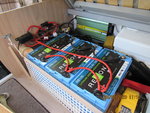nabsim
Full Member
- Messages
- 4,162
That doesn't quite make sense, if you are using 100 amps per day your battery bank is effectively used in two and a half days (50% being safest you drop to) unless you are running Lifepo4. Do you have solar panels topping up while you are awayThe simple way we look at battery power is this. If we decide to go away with the grandkids for a week, the electricity e use goes up and we end up using over 100 amps per day. If the sun shines the batteries get some power back, but if its dull we still have sufficient power to draw on and when we come back home, our 5 batteries may be at half power, but we would have run out if we only had 2 on board. If your payload allows it, then go for extra batts.


